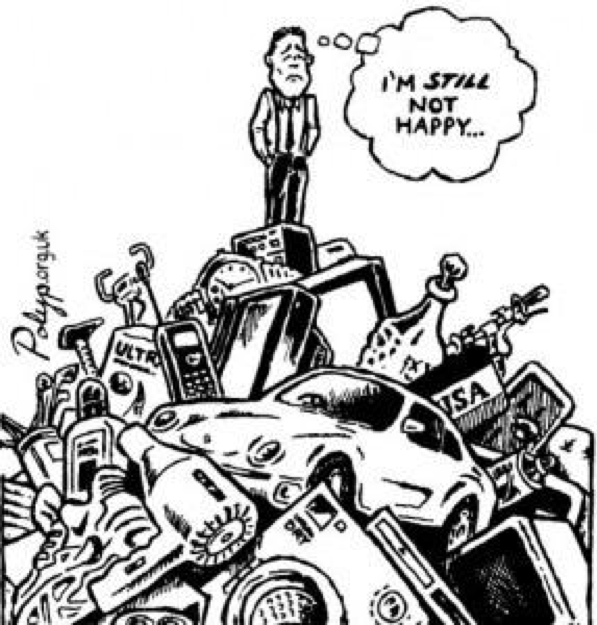Home | Play Synopsis | Resources | Content | Central Questions
Content
The Dramaturgs for TomorrowLove™ have selected a few themes that are addressed in the playlets.
Materialism | Life & Death | Gender | Dependency & Addiction | Voyeurism
Materialism™
Materialism ™ Why have old things when you could have new ones?

Ann-Marie.“Materialism Is Ruining Us.” Materialism Is Ruining Us | Nutmeg Community, www.nutmegcommunity.org/node/153. http://www.nutmegcommunity.org/node/153
Materialism - Definitions & Doctrines
Materialism can refer either to the simple preoccupation with the material world, as opposed to intellectual or spiritual concepts, or to the theory that physical matter is all that exists. This theory is far more than a simple focus on material possessions. It states that everything in the universe is matter, without any true spiritual or intellectual existence. Materialism can also refer to a doctrine that material success and progress are the highest values in life. This doctrine appears to be prevalent in western society today. Materialism can also refer to the term, Cultural Materialism.
Materialism - Philosophies & Worldviews
Materialism and its theories can be traced as far back as the poem "The Nature of Things," written in the first century B.C. by Lucretius. Other defining works include The System of Nature by Paul d'Holbach, Force and Matter by Ludwig Buchner, and the more recent research done by Richard Vitzthum, Materialism: An Affirmative History and Definition.
Materialism as a philosophy is held by those who maintain that existence is explainable solely in material terms, with no accounting of spirit or consciousness. Individuals who hold to this belief see the universe as a huge device held together by pieces of matter functioning in subjection to naturalistic laws. Since materialism denies all concepts of Special Creation, it relies on the Theory of Evolution to explain itself, making beliefs in materialism and evolution interdependent.
Materialism - A Question of Belief
Materialism, at its simpler level, involves the focus on material 'things' as opposed to that which is spiritual or intellectual in nature. We live in a world surrounded by and composed of matter. It is natural, therefore, that we may become distracted from spiritual or intellectual pursuits by material possessions, but this is frequently where problems occur. We can become obsessed with a desire to obtain them, or simply frustrated by the need to maintain them.
The questions this attitude should prompt us to ask are, "Are material things really more important than anything else? Is material success the highest goal? If things are all there are, what's life all about? Why am I here at all? If life is really just about materialism, why should I even try to live a moral life? What does it matter how I treat others or how I live, as long as I have what I want? Why does what I believe about the origin of life matter? (Materialism)"
“Cultural Materialism.” AllAboutPhilosophy.org, www.allaboutphilosophy.org/cultural-materialism.htm.
“Materialism.” AllAboutPhilosophy.org, www.allaboutphilosophy.org/materialism.htm.
Life & Death™
Want To Live Forever? It’s Easy—Don’t Die!

Welcome to Life≠Death™, a product existing within the confines of our overarching company line of TomorrowLove™. Featured within our layers of relationships, we strive to cheat death, so you don’t have to!
Remember, life is not equal to death—you and your loved one can live on forever with our Life≠Death™ technology.
Image taken from: Moore, Tracy. “Being in Love Means Fantasizing About Your Partner's Death - And That's Totally OK.” Jezebel, 19 June 2013, jezebel.com/5970403/being-in-love-means-fantasizing-about-your-partners-death---and-thats-totally-ok.
The clock is ticking—find out more now!
Life≠Death™ — What Is Life and Death All About?
Define 'Life': The condition or attribute of living or being alive; animate existence. Opposed to death or inanimate existence.
"life, n." OED Online, Oxford University Press, July 2018, www.oed.com/view/Entry/108093. Accessed 16 October 2018.
Define 'Death': The act or fact of dying; the end of life; the permanent cessation of the vital functions of a person, animal, plant, or other organisms. Also: an instance of this; (with specification) a manner of dying.
"death, n." OED Online, Oxford University Press, July 2018, www.oed.com/view/Entry/47766. Accessed 16 October 2018.
The question that begs exploration is: how we can live forever if death is a guaranteed part of life? We look to technology for the answer and the idea of transhumanism.
What is Transhumanism?
As described by philosopher and futurist Max More: transhumanism is a class of philosophies of life that seek the continuation and acceleration of the evolution of intelligent life beyond its currently human form and human limitations by means of science and technology, guided by life-promoting principles and values.
“What Is Transhumanism?” Transhumanism What Is ?, whatistranshumanism.org/.
Transhumanist FAQ: The Transhumanist FAQ was developed in 1998 and authored into a formal FAQ in 1999 through the inspirational work of transhumanists, including Alexander Chislenko, Max More, Anders Sandberg, Natasha Vita-More, James Hughes, and Nick Bostrom, Several people contributed to the definition of transhumanism, which was originated by Max More.
Transhumanism is not so far out of reach in our contemporary society as we might think. Indeed, we are moving toward technology enhancing our everyday living at a rapid speed. As Francis Fukuyama writes: “Transhumanism of a sort is implicit in much of the research agenda of contemporary biomedicine. The new procedures and technologies emerging from research laboratories and hospitals whether mood-altering drugs, substances to boost muscle mass or selectively erase memory, prenatal genetic screening, or gene therapy-can as easily be used to "enhance" the species as to ease or ameliorate illness” (42).
These are baby steps of an underlying agenda of biomedicine—to enhance our biological living in such a way that may one day extend our lives beyond our current life expectancy, or, perhaps, be rid of life expectancy altogether. The question of concern on this topic is an ethical one. That is to say, who will be given the opportunity to use this technology, and “what rights will these enhanced creatures claim, and what rights will they possess when compared to those left behind?” (Fukuyama, 42).
Fukuyama, Francis. “Transhumanism.” Foreign Policy, no. 144, 2004, pp. 42–43. JSTOR, JSTOR, www.jstor.org/stable/4152980.
But what if we were to be rid of our bodies altogether when they do not serve us, and upload our consciousness instead? Futurist Nik Badminton is currently exploring this. He alludes to these possibilities in a Global News interview with Jeff McArthur on April 18th, 2018.
Gender Fluidity
GenderFluidity™ — Bodies do not define gender.

Welcome to GenderFluidity™, a product existing within the confines of our overarching company line of TomorrowLove™. Featured within our layers of relationships, as a spectrum of self-identification and performativity.
“FQ The Essential Dad Mug.” FQ The Essential Dad Mug, FQ Magazine, www.fqmagazine.co.uk/being-dad/item/7090-raising-genderfluid-child.html.
In the University of Waterloo’s Theatre and Performance program, there has been a translation of Rosamund Small’s values of her gender blind script within the rehearsal process led by Director Andrea Donaldson. Donaldson held auditions at the beginning of September 2018, cast 11 students, tasked with performing Small’s play. While the actors knew they were cast in the show, their roles and characters were undefined. They were not cast in their roles until the director and students explored together the full potential of the play through tablework (in-depth analysis of the script), a time of exploration and experimentation.
With 7 chosen playlets from Small’s original script of 15, the 11 actors were given different scene partners and playlets to read through. Depending on the day of the week of initial tablework, the roles of gendered type casting were thrown out the window. Acting duos would be either assigned by the director, or occur randomly from who you ended up sitting beside at the table in rehearsal. This allowed the cast and director to have a fluid understanding of the characters without gender bias, and for greater discovery of the characters from various people reading the lines.
It proved that within the structure of the script, love and relationships can be explored regardless of gender. For example, anyone can go through relationship problems, heartache, feelings of anxiety, and wish for their relationships to be better. No matter one's body shape, sexual orientation or gender, everyone has desires that need to be addressed.
This rehearsal process has helped break gender stereotypes in understanding Small’s work; it will continue to evolve as the rehearsal process continues. For more information on Rosamund Small’s ideas on pushing social boundaries in her work, gender fluidity, definitions, and related topics, please scroll down.
Rosamund Small Interview: In The Greenroom, interviewer: Brittany Kay
Rosamund Small is the playwright of TomorrowLove™. In her interview with Brittany Kay, Small reveals her script to be an attempt at “pushing out ideas of preconceived notions of gender” (2017). An important focus in the performance of this work is the gender-fluid nature of the characters. Small comments on this, saying that “typically we have really gendered stories about anything from a break up to sexual violence to anything really to do with how two people relate in a relationship” (2017). She goes on to explain that, “Those stories can be super valuable, but in this case I wanted to sort of push out of those ideas”, saying that she wanted to explore “the idea that if I didn’t know the gender of the person, how would I navigate that in the writing? The characters have genders because whatever actor is playing them inhabits their gender, but that, I think, is part of a larger piece of the feeling of the show” (2017). It’s about the self and the individual and what is innate to you and how did you end up in your life (2017)?”
“Artist Profile: Rosamund Small, Playwright of Outside The March's ‘TomorrowLove.’” Inthegreenroom, 2 Jan. 2017, inthegreenroom.ca/2016/11/23/artist-profile-rosamund-small/.
Judith Butler on Open Culture Website
To further our understanding of gender and the importance of its place in our culture, we can look at the writing of American Philosopher Judith Butler for more insight. Butler states that “gender becomes naturalized, woven so tightly into the social fabric that it seems like a necessary part of reality rather than a contingent production of history” (Butler 2018). Just how this happens is complicated—we don’t invent these roles, they are invented for us, as Butler argues in her essay “Performative Acts and Gender Constitution”
Judith Butler, Gender Trouble (London and New York Routledge, 1990).
Gender identity “is a performative accomplishment,” she writes, “compelled by social sanction and taboo…. Gender is… an identity instituted through a repetition of acts”. For a somewhat more straightforward summary of her theory of “gender performativity,” see Butler in the Big Think video above, in which she describes gender as a “phenomenon that’s being produced all the time and reproduced all the time". One thing to note about Butler's theory is that 'performativity', though it uses a theatrical metaphor, is not the same as 'performance'. Gender is not a costume one puts on and takes off, like a Shakespearean actor playing male characters one night and female characters the next. Rather, the technical term "performative” means for Butler an act that not only communicates but also creates an identity.
As we might expect of any cultural construct, gender norms vary widely both inter- and intra-culturally and throughout historical periods (2018). And given their constructed nature, they can change in any number of ways. Therefore, according to Butler, “there’s not really any grounds,” as our philosophy explainer puts it, “for saying that somebody’s ‘doing their gender wrong”.
in Gender, Philosophy | February 7th, 2018 1 Comment. “Theorist Judith Butler Explains How Behavior Creates Gender: A Short Introduction to ‘Gender Performativity.’” Open Culture, www.openculture.com/2018/02/judith-butler-on-gender-performativity.html.
Judith Butler Performative Gender Video:
bigthink. “Judith Butler: Your Behavior Creates Your Gender.” YouTube, YouTube, 6 June 2011, www.youtube.com/watch?v=Bo7o2LYATDc#action=share.
Philosophy Tube Video:
For some philosophy on what gender is and where it comes from, you can watch Olly, a YouTuber who goes into in-depth explanation on the topic. He explains Judith Butler’s theories in clear and concise terms. Mentioning that repeated and stylized actions are taught to us and enforced at a young age.
thephilosophytube. “What Is Gender? | Philosophy Tube.” YouTube, YouTube, 29 Apr. 2016, www.youtube.com/watch?v=seUVb7gbrTY&feature=youtu.be.
Dependency & Addiction
DependencyAddiction™ Life is hard, share the load, cling to your partners.

Welcome to DependencyAddiction™, a product existing within the confines of our overarching company line of TomorrowLove™ . Featured within our layers of relationships, it can help your relationships with people and technology flourish healthily on BOTH ends!
“Reaching Hands.” Sundown M Ranch, 3 Sept. 2013,sundown.org/blog/2013/09/03/difference-teen-adult-addiction-treatment/.
Dependency Meaning
Dependence: The relation of having existence hanging upon, or conditioned by, the existence of something else; the fact of depending upon something else (OED).
Dependent: Something subordinately attached or belonging to something else; a subordinate part, appurtenance, dependency (OED).
Depend: With on, upon: To be connected within a relation of subordination; to belong to as something subordinate; to be a dependant of (OED).
Addiction Meaning
Addiction: The state or condition of being dedicated or devoted to a thing, esp. an activity or occupation; adherence or attachment, esp. of an immoderate or compulsive kind (OED).
Addict: That is or has been attached by compulsion or obligation to a person (or occasionally thing); tied, bound; obligated (OED).
Accepting Dependence Promotes Independence
Through a scientific study Brooke C. Feeney explores how, “a close relationship partner’s acceptance of dependence when needed (e.g., sensitive responsiveness to distress cues) is associated with less dependence, more autonomous functioning, and more self-sufficiency (as opposed to more dependence) on the part of the supported individual” (Feeney 268). According to this study, independence emerges from being able to accept dependence and rely on support from partners (Feeney 268).
Feeney references Bowlby in explaining how a person nourishes mentally when they have a secure home-base created by a relationship (normally a child-parent relationship). The individual feels more secure in going out on excursions in life that take them farther away from home-base for longer periods of time. The individual returns to the home base when they feel they need support (sickness, tired, scared, etc.) (Feeney 269). This relationship is nurtured when the home-base individual responds appropriately in a timely manner to the distress signals from the dependent individual (Feeney 269).
In a study using romantic partners Feeney found that, “Results indicated that partners’ dependency acceptance was more strongly associated with recipients’ independence when partners were low in attachment anxiety than when partners were high in attachment anxiety … Thus, a high level of attachment anxiety, particularly in partners, appears to attenuate a few of the associations between dependency acceptance and independent functioning” (Feeney 275-276).
Feeney continued to conduct multiple studies to test her result from the first group of couples. She used multiple different methods to test her hypothesis and found that the results of more studies confirmed her hypothesis further stating that, “strong converging evidence for the hypothesized link between acceptance of dependency needs and autonomous functioning” (Fenney 282) existed between the different studies conducted.
Feeney, Brooke C. “The Dependency Paradox in Close Relationships: Accepting Dependence Promotes Independence.” Journal of Personality and Social Psychology, vol. 92, no. 2, 2007, pp. 268–285., doi: 10.1037/0022-3514.92.2.268.
Online Sex Addiction
“Online relationships can be empowering for many people; that is, cyberspace provides a unique environment for people to experience and learn about relationships and sexuality” (Whitty 1).
The Negative Aspects
Some argue that “due to fewer non-verbal and paralinguistic cues, there is an extremely low feeling of social presence; that is, an individual’s self-perception is reduced and deindividuation is encouraged” (Whitty 3). When social presence is decreased due to the environment of online relationships, communication between relationship partners becomes impersonal (Hiltz, Johnson, and Turoff, 1986; Short, Williams, and Christie, 1976; Sproull and Kiesler, 1986). It is further believed that without the face-to-face, high social presence, personal communication, that communication can become aggressive (Whitty 3). “Cyberspace is a space which fosters deceit, abusive and sometimes even harassment” (Whitty 3).
Positive Aspects
Whitty states that, “Suler (2004) and Joinson (2001) have argued that people can be more honest and open about themselves in cyberspace” (Whitty 4) meaning that perhaps if people are more honest that their cyberspace relationships might be more genuine. Social presence is also on the minds of theorists with a positive view of online relationships. “ McKenna and colleagues have proposed that the lack of social presence provides individuals with more opportunities to present aspects of themselves that they do not feel comfortable with displaying in ordinary face-to-face 5 conversations” (Whitty 4-5). Interestingly Whitty found that, “individuals are able to flirt online by substituting translating traditional offline non-verbal cues into text” (Whitty 5). I think that this mention of flirting is especially relevant to a few specific pieces in TomorrowLove™ in terms of how characters navigate sexual relationships through using technology. Those specific pieces are: Eight Legs, Two Hearts, Til’ Skype Do Us Part, Perfect, and maybe I Wrote You This Letter.
Whitty, M.T. (2008). Liberating or debilitating? An examination of romantic relationships, sexual relationships and friendships on the Net. Computers in Human Behavior, 24, 1837-1850.
Voyeurism™

Noort, Adam van. “Lady Godiva, 1586 - Adam Van Noort.” Www.wikiart.org, 1 Jan. 1586, www.wikiart.org/en/adam-van-noort/lady-godiva-1586.
Voyeurism - A "sexual behaviour" involving sexual arousal from the act of observing an unsuspecting person who is naked, disrobing, or in the process of sexual activity.
American Psychiatric Association, 2000
Etymology – from the French voyeur, literally “one who views or inspects,” from voir “to view,” from Latin videre
“Voyeur.” Etymonline. https://www.etymonline.com/word/voyeur
Theatrical Perspectives:
John R. Ziegler states in “Many Longing Eyes: Embedded Masques and Social Voyeurism on the Jacobean Stage” that a form of socially accepted voyeurism is present in the way theater audiences take part in the experience of a theatre performance. The idea that there are degrees of voyeurism ranging from the common "lay voyeurism" we all may utilize frequently up to a variety categorized within the DSM (Diagnostic and Statistical Manual of Mental Disorders) alongside other paraphilic disorders such as pedophilia and sadomasochism (Metzl 417) are presented in his work.
“Lay voyeurism" or "normative voyeurism" is a common practice used by people on daily basis as a means of social learning (Mitzl 417). Mark V. Flinn, an anthropologist at the University of Missouri, cites in his paper titled Culture and the Evolution of Social Learning, that “complex learning methods use information transfer from one individual to another via “imitation” (Heyes 1994: Galef 1988, 1996; Tomasello 1996). The ability to (1) observe behavior (of parents, ect.), (2) produce a mental image, and (3) reproduce the behavior (imitate or copy) can have tremendous advantages over trial and error (Heyes and Galef 1996). Social learning allows one to benefit from the experiences of others, and to provide co-resident offspring with a head start” (Flinn 34). Theatre can be recognized as a venue for such learning. People may be drawn to some forms of theatre as a method of seeing performers enact situations where characters portray people in vulnerable situations. Zeigler proposes that there may be a history of this documented as far back as the era of the Jacobean stage where London had experienced a period of economic growth. Middle-class citizens could now afford some of the luxuries that were at one time closed off to them, and theatre was a window into the lives of the aristocracy that was becoming an object of desire (Ziegler 17). A new demographic of society could now simply buy a ticket and watch people enact situations which were difficult to understand, there was a place to watch and learn, a new platform to experience culture had become available.
Ziegler, John R MA. Many Longing Eyes: Embedded Masques and Social Voyeurism on the Jacobean Stage, 2012
Metzl, Johnathan M. From scopophilia to Survivor: a brief history of Voyeurism, Textual Practice 18(3), 2004 pp. 415-34
Historical Perspective:
Lady Godiva was the wife of an English nobleman who rode nude through the streets of Coventry to gain remission for her husband’s heavy taxation of the people. Although Lady Godiva was performing an act of debasement or degradation, later versions of the story introduce the character of the “Peeping Tom,” who was stricken blind for being a voyeur of the lady, as she road through the town (Abramoff, 179).
This character is present in many of the artistic representations of the story dating back as far as the late 16th century and it featured in a window in the upper left corner of the painting of Lady Godiva by Adam Van Noort finished in 1587 (Abramoff, 179). Lady Godiva is believed to have died sometime between the mid to late 11th century (Britannica, 2013).
Abramoff, Kristine V. “An Early Instance of the Voyeur in the Story of Lady Godiva”. Oxford University Press, (2018) : 179-180.
Lady Godiva, Old English Godgifu, (died between 1066 and 1086), Anglo-Saxon gentlewoman famous for her legendary ride while nude through Coventry, Warwickshire.
A later chronicle asserts that Godiva required the townsmen to remain indoors at the time fixed for her ride. Peeping Tom, a citizen who looked out his window, apparently became a part of the legend in the 17th century. In most accounts he was struck blind or dead.
Britannica, The Editors of Encyclopaedia. “Lady Godiva.” Encyclopædia Britannica, Encyclopædia Britannica, Inc., 19 June 2013, www.britannica.com/biography/Lady-Godiva.
Peeping tom, person who derives sexual satisfaction from watching from hiding places as others disrobe or engage in sexual acts. The term derives from the legendary Peeping Tom, a prying tailor who was struck blind (in some accounts, struck dead) for opening his window and watching Lady Godiva as she rode naked through Coventry to demonstrate against heavy taxes on the town. Though Godiva’s ride supposedly took place in the 11th century and was recorded as early as the 13th, the legend of Peeping Tom was not added to the story until about the 17th century.
Britannica, The Editors of Encyclopaedia. “Peeping Tom.” Encyclopædia Britannica, Encyclopædia Britannica, Inc., 20 July 1998, www.britannica.com/topic/peeping-tom-sexual-behaviour#ref144309.
Social Learning Perspective:
Voyeurism: It Is Good As Long As We Do Not Get Caught
To determine whether “normal” people would engage in voyeurism, a sample of university students was asked to report whether they would watch an attractive person undressing or two attractive people having sex in hypothetical situations (BJ Rye, Glenn J. Meany 47).
Although voyeurism is normalized by both theories, they make different predictions. Evolutionary theories predict that sexual looking will occur to the extent that it contributed to reproductive or mating opportunities. On the other hand, social learning predicts that people will engage in voyeurism when the opportunity is present, but only when the behaviour had been previously rewarded and the benefits of looking outweigh the costs (BJ Rye, Glenn J. Meany 49).
As with many behaviours, however, the role of social learning in voyeurism may be more of modulation than acquisition. That is, voyeuristic tendencies may be acquired in many ways, including both evolutionary adaptations and social learning. The subsequent expression of those tendencies is then modified by environmental constraints, such as prevailing social norms (BJ Rye, Glenn J. Meany 49).
Rye, B.J. Meany G.J. “Voyeurism: It Is Good As Long As We Do Not Get Caught”. International Journal of Sexual Health, Vol 19 (2007): 47-56.
Sexual Strategies Theory: Historical Origins and Current Status
David M. Buss’s Sexual Strategies Theory presents a view of human sexual psychology as a rich repertoire of mechanisms that have evolved as adaptive solutions (David M. Buss 19).
These evolved mechanisms are sensitive to context and are functional. Mechanisms evolve in response to specific environmental contingencies. They are not blind or robotic, nor do they express themselves invariant ways, insensitive to context. The flexibility of human behaviour is caused by the large collection of evolved mechanisms, activated selectively and sequentially, depending on context (David M. Buss 24).
Buss, D.M. “Sexual Strategies Theory: Historical Origins and Current Status”. Journal of Sex Research. 35 (1998): 19-35.
Culture and the Evolution of Social Learning
Social learning is viewed as a general all-purpose, non-selective sponge by which cultural information is acquired and transmitted (Flinn, MV 26).
Culture
=
Learning
(Flinn,
MV
31).
The ability to (1) observe behaviour (of parents, ect.), (2) produce a mental image, and (3) reproduce the behaviour (imitate or copy) can have tremendous advantages over trail and error (Heyes and Galef 1996) Social learning allows one to benefit from the experiences of others, and to provide co-resident offspring with a “head start” (Flinn, MV 34).
Flinn, M.V. “Culture and the Evolution of Social Learning”. Evolution and Human Behavior. 18 (1997): 23-67.
Bonus Material™
Interested in exploring more? Check out the links below!